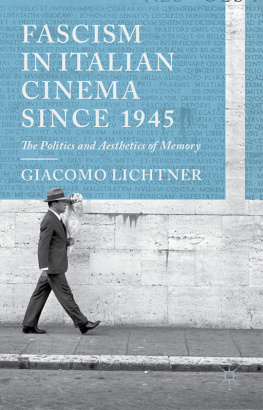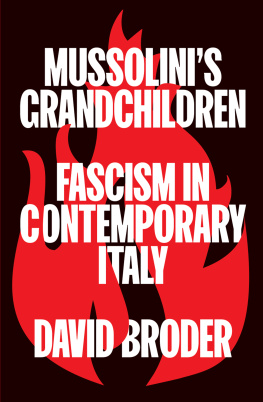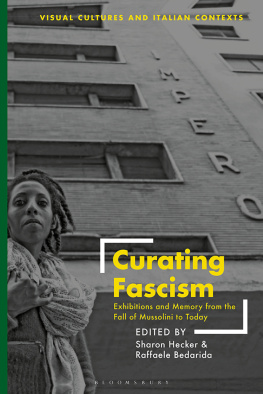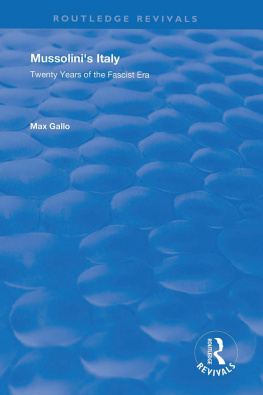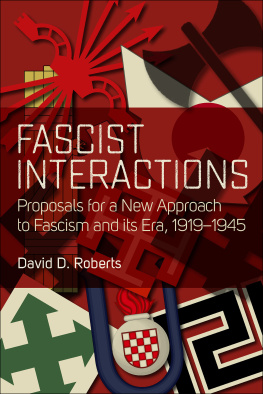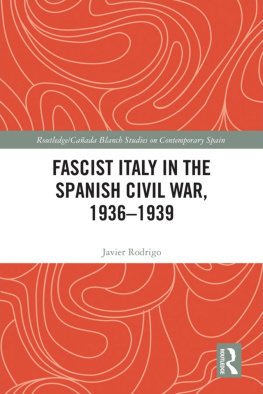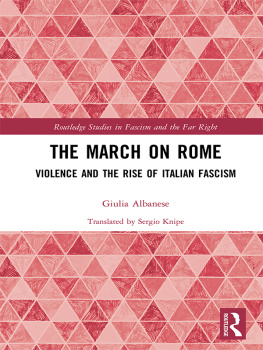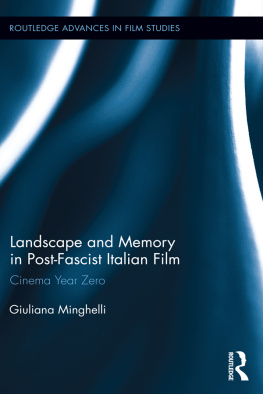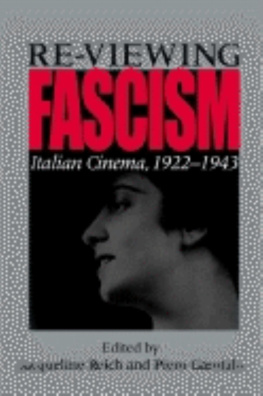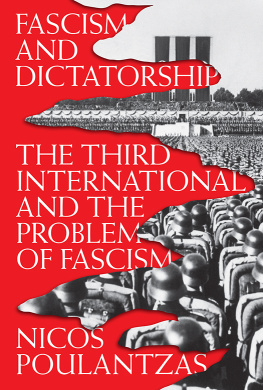Fascism in Italian Cinema since 1945
Fascism in Italian Cinema since 1945
The Politics and Aesthetics of Memory
Giacomo Lichtner
Victoria University of Wellington, New Zealand


Giacomo Lichtner 2013
All rights reserved. No reproduction, copy or transmission of this publication may be made without written permission.
No portion of this publication may be reproduced, copied or transmitted save with written permission or in accordance with the provisions of the Copyright, Designs and Patents Act 1988, or under the terms of any licence permitting limited copying issued by the Copyright Licensing Agency, Saffron House, 610 Kirby Street, London EC1N 8TS.
Any person who does any unauthorized act in relation to this publication may be liable to criminal prosecution and civil claims for damages.
The author has asserted his right to be identified as the author of this work in accordance with the Copyright, Designs and Patents Act 1988.
First published 2013 by
PALGRAVE MACMILLAN
Palgrave Macmillan in the UK is an imprint of Macmillan Publishers Limited, registered in England, company number 785998, of Houndmills, Basingstoke, Hampshire RG21 6XS.
Palgrave Macmillan in the US is a division of St Martins Press LLC,
175 Fifth Avenue, New York, NY 10010.
Palgrave Macmillan is the global academic imprint of the above companies and has companies and representatives throughout the world.
Palgrave and Macmillan are registered trademarks in the United States, the United Kingdom, Europe and other countries.
ISBN 9780230363328
This book is printed on paper suitable for recycling and made from fully managed and sustained forest sources. Logging, pulping and manufacturing processes are expected to conform to the environmental regulations of the country of origin.
A catalogue record for this book is available from the British Library.
A catalog record for this book is available from the Library of Congress.
For Nikki.
I will leave an extra pint
Figures
Acknowledgements
Many remarkable people contributed to the conceptualising and writing of this book, and their generosity fills me with gratitude and pride. I am grateful to Richard Bosworth, whose sobering thoughts in the foreword to my first book moved me to undertake the project. He supported me kindly and rigorously at many points along the way and his coherence in dissecting Italian history continues to be an inspiration. Sally Hill was among the first to hear of the project, and throughout its development she has been invaluable sounding board and marvellous friend, sophisticated critic and brilliant writing companion. Like Sally, Mark Seymour read parts of the typescript with a sharp, elegant and methodical editorial mind that I am ever in awe of. Giovanni Tiso pored patiently and cheerfully over dense 1950s literature with the critical gaze that marks all his work, and for that and much more I am grateful to him and his wonderful family.
The help of many other colleagues and institutions must be acknowledged. Victoria University of Wellington supported the project with several grants. I am indebted to Charlotte Macdonald (for, well, everything), and to Steve Behrendt for putting up with me during the writing, as did all the History Programme. I am grateful to Hannah Blumhardt, Ruth Ben-Ghiat, John Foot, David Forgacs, Mia Fuller, Jennifer Frost, David Laven and Chris Wagstaff, who all contributed ideas or encouragement. In Rome, Maurizio Zinni was generous with his time and thoughts, and I am grateful to him and Luigi Goglia for sharing the resources of the Laboratorio di Ricerca e Documentazione Storica Iconografica at Romes Terza Universit. I would also like to thank a number of other Roman repositories and their staff: Gianpiero Tulelli and Maurizio Grillini of the Ministero dei Beni Culturali granted me access to the Ufficio di Revisione Cinematografica, where their team were refreshingly welcoming to the stranger sharing their desk; Antonella Felicioni and Valentina helped me navigate efficiently the treasures of the Fototeca at the Centro Sperimentale di Cinematografia, and I am particularly grateful to them for providing the copyright to many of the illustrations in this book. Bob Lowe and Marco Sonzogni turned the poem from Il Federale into a translation as witty and sophisticated as its authors. Furthermore, I would like to thank the editorial team at Palgrave Macmillan, and especially Felicity Plester, for believing in the project from the outset.
Finally, I continue to incur a great debt to my family: to my parents Rudi and Cristina, whose own inspirational histories of gentle and uncompromising commitment intertwine in many places with the story told in this book; to my daughters Sara and Rebecca, who are just as honest and brave as their nonni; and to my fairly fabulous Nikki, to whom this book is dedicated.
Part I
Revisionism
Remembering the Long Second World War in Europe
If any further proof were needed, European memories of World War Two since 1945 prove that remembrance, in both its private and public forms, constitutes a powerful historical force in its own right, able to shape opinions, actions and events. Almost without exception, the memory of that terrible conflict has haunted the continent. Far from being the inert prerogative of witnesses and survivors, it has formed bonds and assumed new, shared identities; often sanitised, it has served governments well, and yet at times it has mastered them, rediscovering itself raw and untreated. Taking on unexpected meanings, it has adapted to new generations of Europeans who had no memory of the war itself, or had only a second- or third-hand one. In its infinite incarnations, throughout its long lulls and sudden bursts onto European political and cultural agendas, remembrance has engendered countless narratives of the past that have shown remarkable ability in adjusting to local contexts, from the polished national narratives of textbooks and monuments to half-forgotten stories around oxidised bronze plaques in village squares.
The fact that the inevitable departure of witnesses of the war does not abate political debates on the meaning, legacy and morality of the conflict and its belligerents demonstrates two elements that it is important to bear in mind on the approach path to this slippery subject. In the first instance, it shows that the memory of traumatic historical events can become an integral part of the moral and political identity of a nation or of groups within a nation and that, when that happens, it develops an inter-generational significance, a life of its own, severed from the original events. In the second instance, it lays bare that memory is not primarily about the historical analysis of the past, but rather about the political interpretation of the present. These are the lessons that Pierre Nora, Jay Winter, Peter Novick and many other scholars, working on many case studies and through many different kinds of sources, have taught us since the late 1980s. In establishing the study of memory as a legitimate branch of the historical discipline, their work has led to a boom in memory studies, which has in turn overcome an early tendency to see history and memory as distinct and separate. They are not; they are linked inextricably by the media through which each is constructed and the political lenses through which each is interpreted.
Even as I write, a passing glance at English-language news in the first months of 2011 reveals not only this bond between history and memory, but also Europes ongoing sensitivity with regard to World War Two. In Germany, online retail giants
Next page
